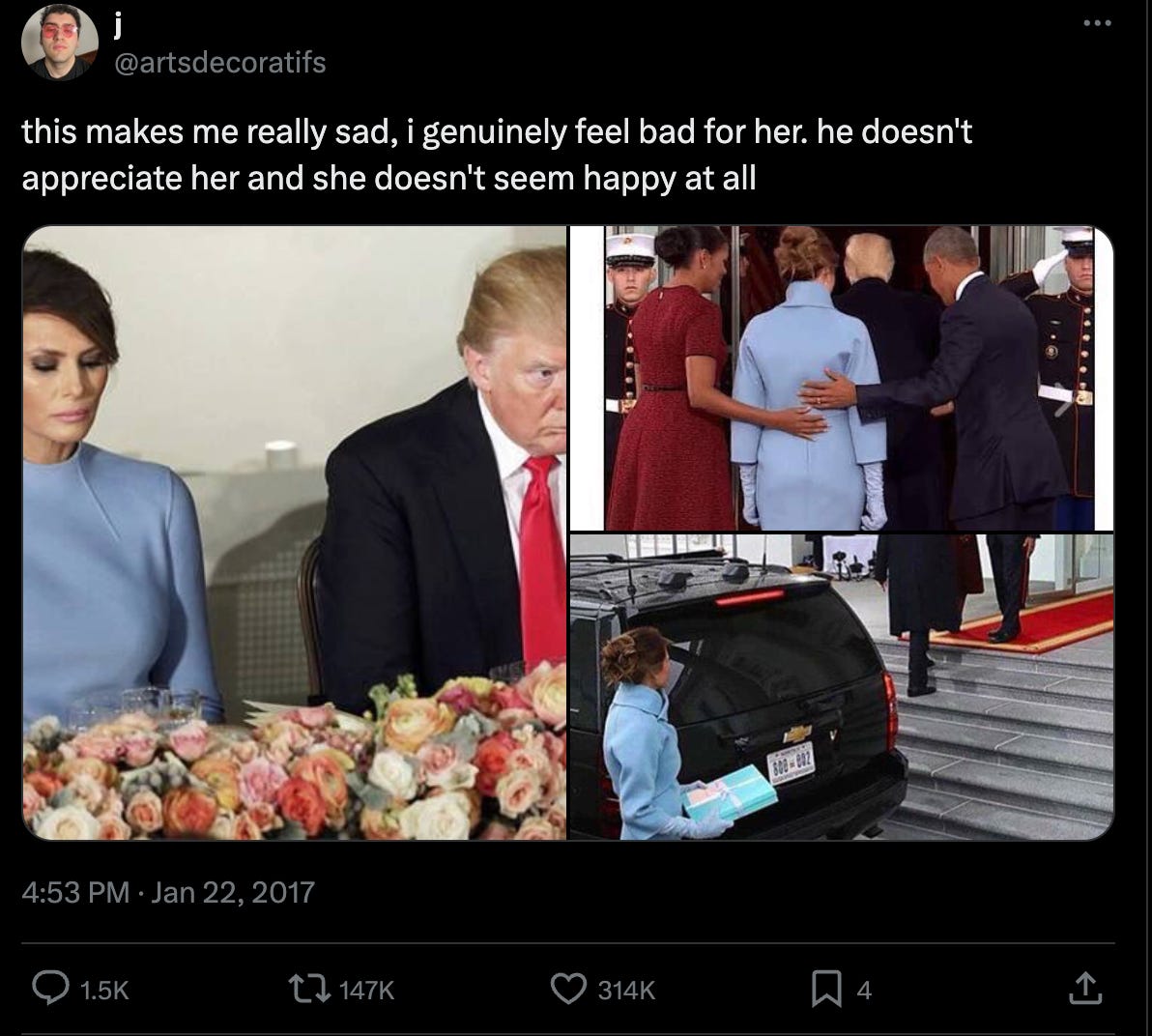In January of 2017, during the inauguration of President Donald Trump, images of first lady Melania Trump looking downcast and angry in the presence of her husband went viral on Twitter, accompanied by the hashtag #FreeMelania.
“Blink twice if you need help,” people tweeted. Self-described “communication and body language” experts weighed in. Melania wasn’t happy. Melania was trapped. Was she a victim of abuse?
It was a selective and strategic sympathy used specifically for a certain kind of beautiful white woman.
Surely she was trapped. Surely she didn’t know what she was doing before it was too late. Surely.
This month, Melania released an autobiography published through Skyhorse, a publishing company with a reputation for peddling books that push the Plandemic conspiracy, Holocaust denialism, and vaccine skepticism. Calling Melania’s work a book is a generous interpretation of the material. It’s more like a series of flat anecdotes. She learned hard work from her parents. She loves her son. She made many memories as first lady. Once she describes looking out a window and watching Barron playing “sports.” Not a specific sport. Just sports.
The book, which has no named ghostwriter, feels like it could have been written with the help of AI, and is peppered with pages of meaningless prose of generic platitudes. Few historic moments are mentioned. Her husband’s many trials and sexual assault convictions, for one. Stormy Daniels, Pizzagate, and the racist birtherism conspiracies that Melania herself perpetuated, to name a few more. She also, oddly, does not name her stepchildren. She mentions only that they exist and that she doesn’t agree with them on everything.
When and where she does weigh in on the events of her husband’s presidency, she is always the victim — not of her husband, but of the media, the American public, presumably you and me, and perhaps a few Trump aides.
When she writes about plagiarizing Michelle Obama’s speech for the Republican National Convention, she tries to have it both ways. Claiming that she wanted to write the speech herself, but then blaming an aide who was supposed to vet the speech.
When she writes about wearing the “I really don’t care, do u?” jacket to the border, she says the jacket was a statement about how “the media” writes misinformation about her husband and her family. And of course, “the media” took it the wrong way, she writes. “It was just another example of the media’s irresponsible behavior.”1
And those family separations? That “was not the government but the dangerous influence of criminal cartels in their home countries.”
She mentions the Black Lives Matter protests outside the White House during 2020 for several pages, condemning what she calls violence and unrest. Yet, when she writes about the January 6 insurrection, she describes a day where she was lost in archival work and, when she was reached for comment about the violence, professed complete obliviousness and ignorance. She makes no mention of the violence that day.
Later, she soft-pedals election interference claims, noting, “Many Americans still have doubts about the election to this day. I am not the only person who questions the results.”
There is also the absolutely random, although much-publicized, passage about the right to an abortion. It is preceded by no mention of the overturning of Roe, for which her husband was largely responsible.
The former first lady professes shock, outrage, and confusion that people would not want to work with her after her husband’s presidency. The raid on Mar-a-Lago over the mishandled documents is brushed away as the “lengths to which my husband’s political adversaries might go, but this development was an unprecedented low.”
Reading this book offers more questions than answers. Like, for example, how did her grandparents make it out of World War II in a wealthy and privileged position? How did her father manage to be one of the few rich men in the Communist party in Slovenia? How did her family afford an apartment for her and her sister to live in? Was her rise in modeling as simple and as easy as she depicts?
The world she describes in this book is one of strategic oblivion, the beautiful bright glow of her life hiding so much of the ugly reality. And the world she describes is small. She has no friends. She’s close to her parents and her son. It’s a gilded corner she’s backed herself into, but she seems happy enough to be there.
Melania Trump defends her husband and ignores the truths that would contradict her narrative. Like her husband, she is both the victim and the hero. She is a long-suffering servant to her adopted country who has, in her view, never done anything wrong. If you think she has, well you are the cancel mob. You are “the media,” you are an enemy. You are the aide who didn’t vet her speech.
Coverage of Melania’s book has asked whether she’s using this moment as an attempt to distance herself from her husband. But this book isn’t a separation; it’s a continued pledge of loyalty. Other interpretations are condescending, infantilizing. Writing in 2017, Stassa Edwards noted, “Melania Trump is hardly a stand-in for American women, she is neither a victim nor is she lacking agency. Rather she’s an active participant working to construct Donald Trump’s narrative, readily available to put a gauzy domestic veil on his racism and misogyny. Melania Trump doesn’t deserve your sympathy.”
That’s true to this day. But I would argue that in some ways Melania is a stand-in for American women, specifically the white women who support Donald Trump.
There is a movement now to tell white women that their husbands won’t know who they voted for. This movement, like the #FreeMelania movement, imagines a woman who doesn’t really exist. It’s a strategic sympathy that imagines women, not as they are, but as we want to see them. Beautiful and tragic rich ladies, locked in a gilded cage of their husband’s making.
This is not to say that coercion and domestic violence do not exist. But rather that, statistically, inter-political marriages are rare. And if you suspect there are secret Harris voters in marriages, you can’t ignore that there are secret Trump voters, too.
It’s frankly condescending to assume that white women vote for Trump because they feel like they have to. Imagine being a white woman who votes for Trump and seeing that messaging. It’s just as sexist as claiming that Harris voters are supporting a woman simply because they too are women.
White women largely aren’t voting for Trump because they are victims of Trump or their Trumpy husbands, but because they want to. Because patriarchy benefits them. Because the gilded oblivion is nice if you can get it, if you can hide yourself away in a world where you can believe whatever you want.
Recently, a Utah influencer, McKinli Hatch, has been posting loud and proud MAGA memes on her page. When people asked her why she was advocating for a president who would undercut her rights, she posted a story on Instagram that basically said, Second Amendment rights were her rights and all she needed to protect herself. She somehow believes both in the right to choose and the rights of the “unborn.” It’s a manifesto that says everything it needs to. But, looking at the comments of her MAGA posts, you’d be led to believe she was anything other than a grown woman who is choosing what “will give her and her family the best chance to succeed” over everything else.
Women like McKinli and Melania are not voting against their self-interest, because white patriarchy is a white woman’s interest. They are beneficiaries of the powers of wealth, class, and whiteness. That is what they wish to uphold.
We shouldn’t pretend we don’t understand “those women.” Because it’s not just right-wing women or men who hold onto complicity to oppressive systems. Out on a book tour, I’d talk to women who’d describe horrible marriages but say they didn’t want to leave because they didn’t want to give up the house. Their freedom wasn’t worth more than a McMansion in a suburb. It’s the same logic that believes you can date your way out of systems of sexism or misogyny, that turns a blind eye to the ways in which white flight, gentrification, and school choice, all lead to freedoms for upper- and middle-class white kids, but oppression for others. It’s the same logic that bombs other children while we sit at home and grouse about our own rights. We are all complicit.
And after eight years, we still can’t see Melania clearly. Because we don’t want to see ourselves clearly. We want our beautiful princesses in a tower to want to be rescued. The cultural insistence on seeing women like this as ignorant victims erases their own participation in the oppression of others. But we cannot begin to dismantle these cages until we take women seriously. Until we stop employing the strategic sympathy that dismisses allegiance to patriarchy as coercion rather than complicity. And in this conversation, whose lives and whose freedoms are lost? Who actually deserves our sympathy and efforts and communication? It’s not Melania.
Take Melania at her word. She doesn’t want your help. And she simply doesn’t care.
It’s worth noting that New York Times correspondent Katie Rogers reported that the jacket was actually part of a four-year campaign against Ivanka Trump. So, there are a lot of obfuscations here.







Yes, yes, a million times yes. In 2017, I tweeted (Facebooked?) something to the effect of “Melania built her gold toilet; she can now shit in it.”
"Women like McKinli and Melania are not voting against their self-interest, because white patriarchy is a white woman’s interest. They are beneficiaries of the powers of wealth, class, and whiteness. That is what they wish to uphold." This a thousand times. In her book "Caste", Isabel Wilkerson shares a conversation she had with someone that states exactly this about white people generally voting for white supremacy over democracy and social services, because white supremacy serves them and that is absolutely in their interest.